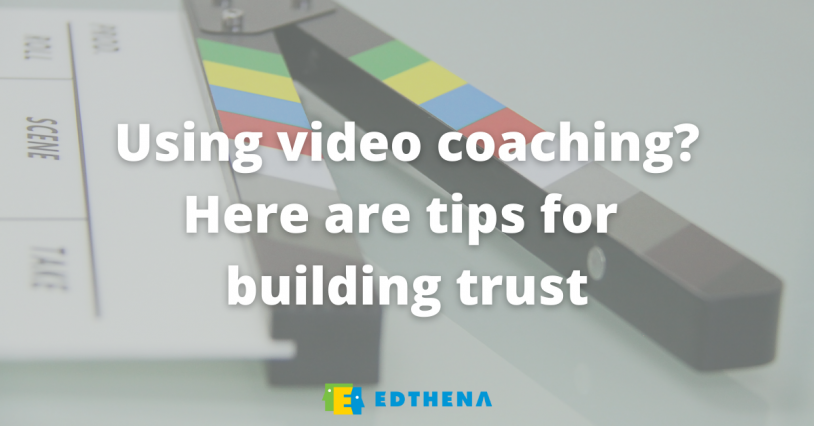Trust is a Must for Teacher Video Coaching. Here’s How to Foster It

Maybe you just started using video coaching to support teachers or maybe you’ve been using it for years.
But are the teachers you support resistant to the technology or are you just not making as much progress as you’d hoped?
You might be missing the trust factor.
Emotional intelligence and safety in working relationships are integral to giving and implementing feedback. Not sure how to gain teachers’ trust while using video coaching as part of your instructional coaching process?
Here are three important ways to foster trust with those you support, specifically in the context of a video coaching platform like Edthena.
Get to know the teachers you support for instructional coaching
Sure, virtual coaching has made it easy to watch teaching videos and efficiently give feedback. But coaching teachers is about more than just commenting on their grows and glows.
As a coach, it’s crucial to get to know the teachers you support, especially when there is less, or no, in-person opportunities for building rapport.
Here are 7 relationship-building questions you can ask to show your teachers that you care about them as people and gain their trust:
- Tell me about yourself.
- What are your top 3 values that drive you as a person?
- What brings you to this work?
- What are your personal strengths?
- What is your vision for yourself and for your work?
- How do you best receive and process feedback?
- What should you and I commit to for our relationship?
Use these questions to cultivate a strong human connection even while employing tech.
Be upfront about the video coaching process
Using video coaching with teachers who are not familiar with a virtual professional learning space might feel awkward. Break that tension!
Be straightforward about how video observation and video coaching is a different medium for feedback. Openly discuss what will feel similar or unusual about video coaching compared to in-person coaching, and be upfront about how it will work.
Are your teachers uncomfortable with recording themselves? Make sure they know their videos will not be used to evaluate them, only to support them.
Teachers may even feel overwhelmed with the technical aspects of online coaching. Be sure you’ve walked through the video coaching process so they know exactly what tools to use and when to use them.
The more transparent you make the video coaching process, the more teachers will trust that this medium will be used to support them and their instructional growth.
Coaches, turn that video camera onto yourself
People trust a process when they see someone else doing the same thing.
In this case, you can be the someone else.
Using video to drive your own professional learning sets the example and model for your teachers. For example, record a PD session you’re leading or record a demo lesson as ways to show how you use video to get better at your own practice. You can even record an in-person coaching conversation for reflection via video.
When you use video reflection as a tool for yourself, you’re showing that you trust it … and that’s contagious.
Don’t let mistrust stunt your video coaching
Video coaching and virtual coaching have been shown to support flexibility and collaboration without giving up efficacy — that is, when trust is woven into the process.
If you’re looking for more on cultivating strong relationships with educators you support, check out our post on skills to cultivate empathy.

